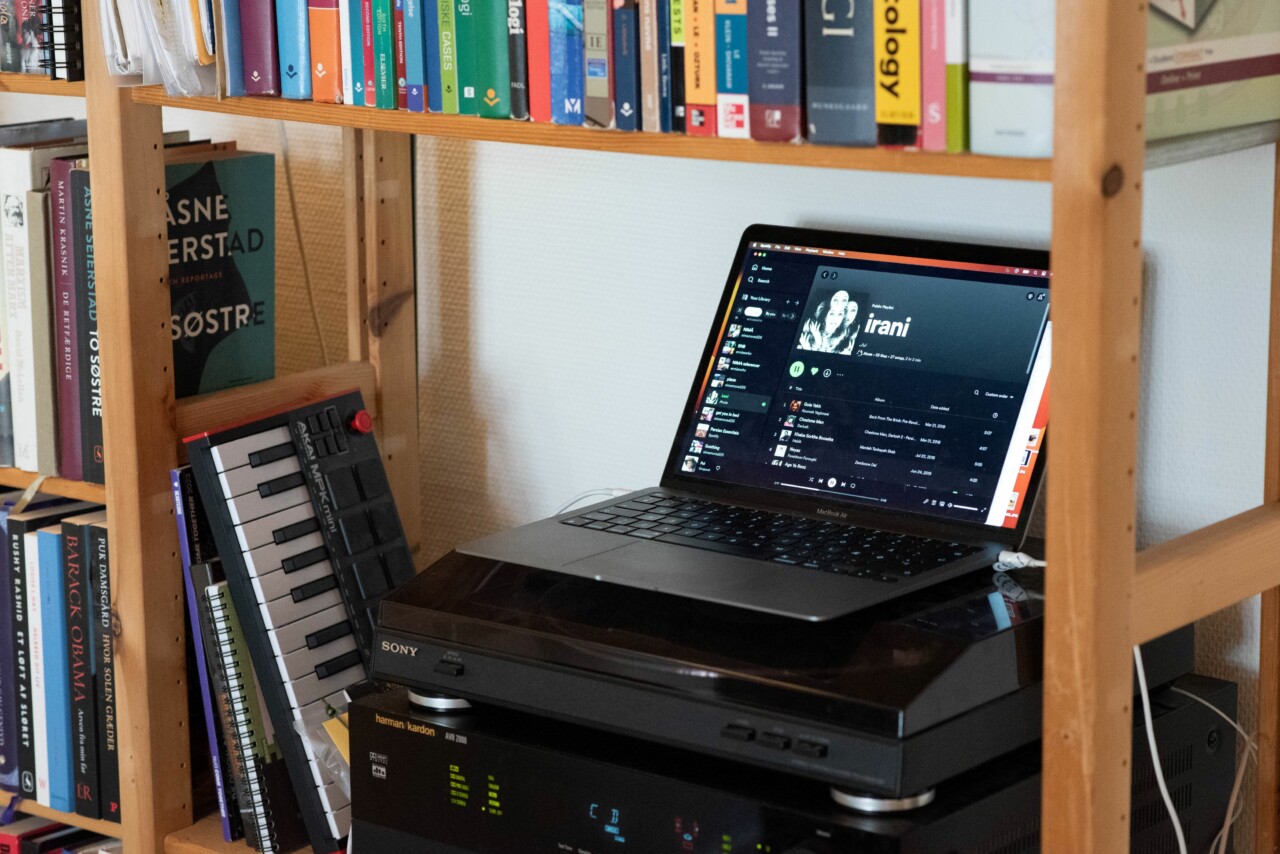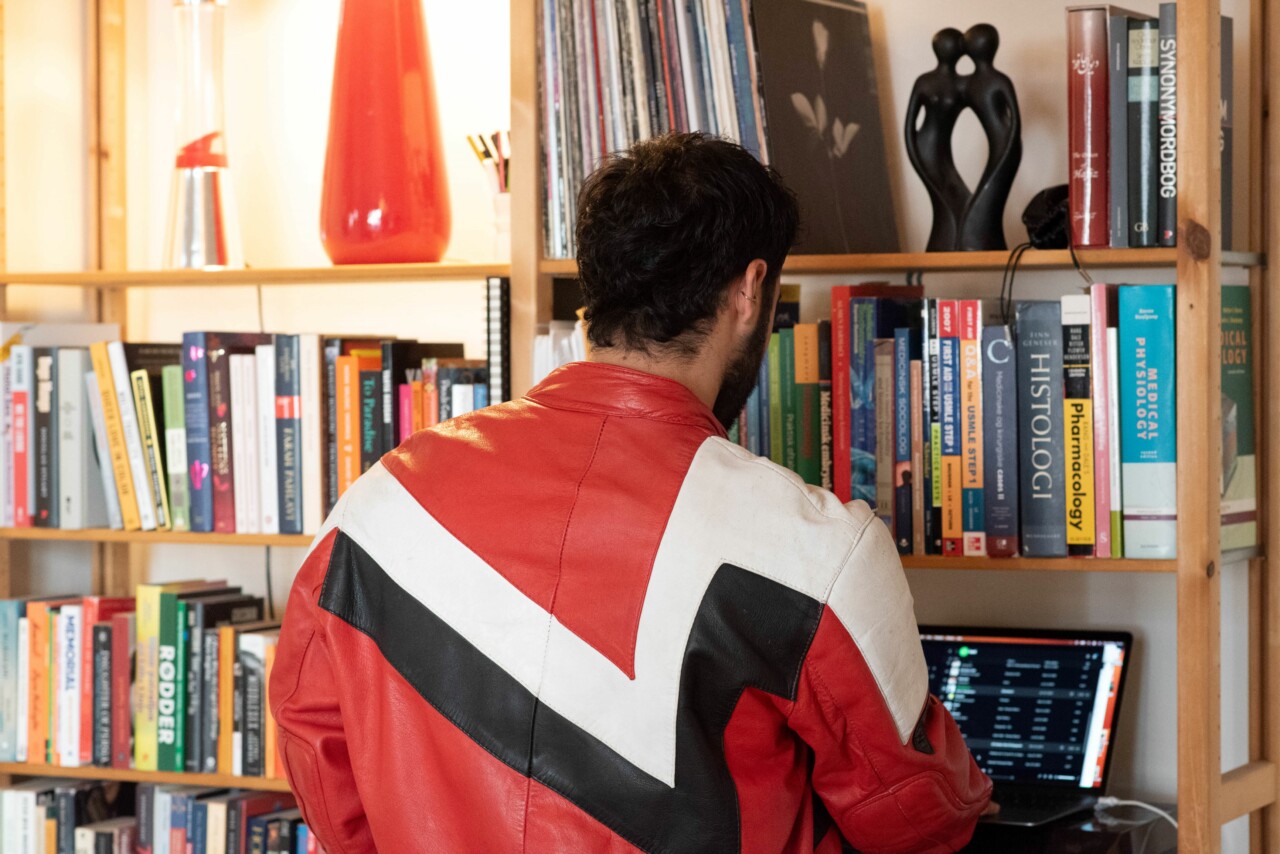Universitetsavisen
Nørregade 10
1165 København K
Tlf: 35 32 28 98 (mon-thurs)
E-mail: uni-avis@adm.ku.dk
—
Politics
Protest — Nima Moradi is a medical student at the University of Copenhagen (UCPH). Between his exams and his work in psychiatry, he fights against the theocratic regime in Iran as an activist in Copenhagen. This includes singing a protest song that silenced its author and had him sent to jail.
»I feel my mother’s pain when she stands at the front of demonstrations with her hand up shouting Zan, Zendegi, Azadi or ‘Woman, Life, Freedom’ in Farsi.
This is what Nima Moradi says over a cup of tea in his apartment in Nørrebro. On the table, he has set out cookies and some giant blackberries. And on the stereo, a playlist of old Iranian classics is being streamed. On the wall behind us is some Iranian contemporary art, and on the windowsill there are large ceramic lamps gathered in from second-hand shops across the country.
Nima Moradi has felt himself how trauma spans across generations. As a child of refugees that fled Iran 44 years ago, his parents’ pain has been a constant companion. A pain that he has become acutely aware of over the course of the last year, and that was documented in a Danish TV documentary ‘Iran in the heart’.
I would like to combine the beauty of my Iranian homeland with my own universe at home.
Nima Moradi
On 16 September 2022, it was announced on social media that the young girl Jina Mahsa Amini had been killed in the custody of the Iranian morality police.
»I closed my eyes to it at first. I said to myself: It doesn’t exist.«
But Nima Moradi just couldn’t ignore it. Shortly afterwards, he helped mobilize large groups of Danish-Iranians as co-organizer of the first major demonstration against the theocratic regime in Copenhagen, where he also presented at the event.
»I feel that my role right from the beginning has been to listen to what the Iranians in Iran need. When they record videos from the streets, it is my duty to help give them a platform, because that is what they are asking for,« says Nima Moradi and continues:
»They are asking us that the whole world is made aware of the atrocities that are going on in Iran. I feel that it is my small, modest, role here at home to magnify the voices in Iran and to become a mouthpiece for them.«
In addition to organising demos, and receiving patients in the psychiatric emergency ward, Nima Moradi is doing his final semester on the medical programme. He is writing his master’s thesis at the same time. He also works with music, and publishes songs and plays concerts.
When he was a child, it was his dream to become a great singer. He wanted to be a singer that resonated emotionally with other people, just like he was himself by music.
»I loved singing and dancing, and anything to do with music set off strong feelings inside me.«
At the demonstrations, he has sung the Iranian protest movement’s anthem ‘Baraye’ by Shervin Hajipour. In February the song won a Grammy in a new special category which recognizes music that has contributed to social change.
About
Nima Moradi is 30 years old and a medical student at the University of Copenhagen. He will be starting hospital duties this January. In addition to being MD (Doctor of Medicine) he has a bachelor in pharmacy. He works as a substitute doctor at the psychiatric emergency department, publishes music under the stage name NIMĀ and has played at the Danish Rainbow Awards and Copenhagen Pride.
The song is a collection of tweets that were written at the beginning of the resistance struggle about why people took to the streets. After its release, Hajipour was jailed for two weeks – and has been quiet ever since.
»In the beginning, it was really, really weird for me to have to step up and sing another person’s song,« says Nima Moradi.
»The song embraces everything that’s wrong in Iran, and why it is that people seek freedom. So I’ve thought if he can’t sing his protest song, I can. I’m a young guy just like him, I have the voice, and I have the opportunity.«
Nima Moradi creates his own music on the side also. His Iranian background has begun to take hold here as well.
»I sometimes sample something melodic from an old Iranian song, or use a phrase from an Iranian song that I think is really beautiful. I have started to have a deeper intention when I make my music. And I want to combine all the beauty of my Iranian homeland with my own more superficial solo universe here at home.«
Nima Moradi is ambitious, and structured. And when you ask him how he can be an activist, a musician, a student, a son and a friend, he replies that he categorizes and structures everything in his head.
This let him take his eleventh semester courses at the same time as his ninth semester courses. He also wrote his master’s thesis over the course of the summer holidays.
»I just wanted to finish,« he says.
For Nima Moradi, it’s all about finding the balance in the complexity between his studies, his activism, his music, his leisure time, and his Iranian background. Because he takes it all with him when he goes to work in the psychiatric emergency department.
»When a minoritized person comes in, I sense from the first glance that there is an alliance between us. I understand them and they understand me. It gives them a particular feeling of safety to meet an ethnically minoritized person in the system. And here I feel how important my work is.«
Nima is still working on finding a balance between all the aspects of his life. Being Iranian and Danish. Being a doctor and a musician. And being a political activist and private person.
»Unfortunately, during my childhood and teenage years, I found it a bit embarrassing to be brown-skinned, to look the way I do, and to have my name. In primary school, if there was a parents meeting and you had to stand up and say the names of your parents, I found it really embarrassing because mine weren’t called ‘Gitte’ and ‘Søren’,« he says.
»I feel my mother’s pain when she stands at the front of demonstrations with her hand up shouting Zan, Zendegi, Azadi.
Nima Moradi
But that has changed, especially over the past year:
»I find it a lot easier now. I’m proud of my homeland, I’m proud to be Iranian, and I’m incredibly proud of my parents — including their names. Thanks to the people of Iran, and thanks to social media, their struggle has reached people throughout the world, and it has pulled us together and put us on the agenda.«
When I ask about what the future looks like for Iran, it suddenly goes quiet in the apartment in Nørrebro. Nima Moradi does not believe that the regime will fall anytime soon. But he thinks that it has become easier to be a woman in Iran today than it was just one year ago.
»The Iranian woman has always had a revolution. Being an Iranian woman is a revolution in itself. I think that the times will slowly make space for women to flourish even more.«
And what does the future look like for you personally?
»I see myself on a mountain, maybe in northern Italy, with an orangery. Completely relaxed – maybe in ten years,« says Nima Moradi, who dreams of a bit more peace and quiet.
»The future is hopefully calm and balanced and filled with love, good people, and the joy of getting up and doing the things I do — whether I’m just a doctor, just a musician, or still balancing between those two things.«

